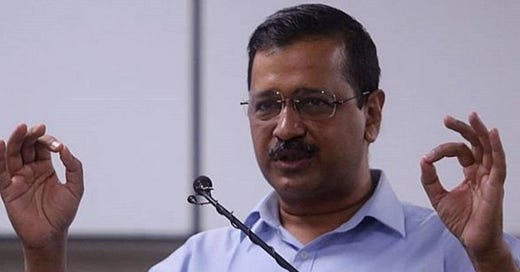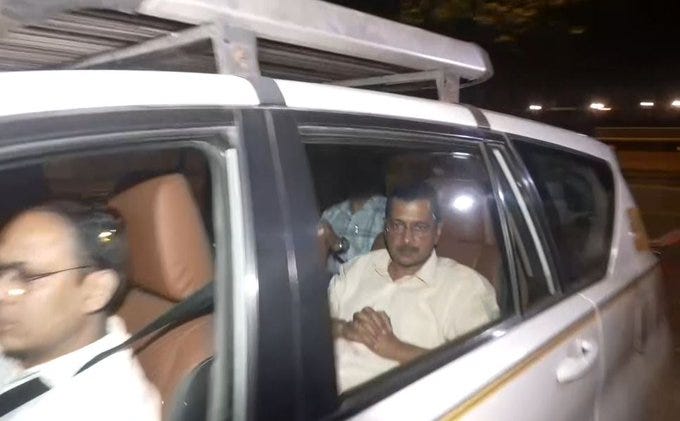Analysis of Kejriwal's Bail Order; Delhi High Court Stay
Succinct Analysis of the 26-Page Order by Vacation Judge Niyay Bindu Granting Bail to Arvind Kejriwal, Temporarily Stayed by Delhi High Court Until Monday.
The 26-Page Order by Vacation Judge
The 26-page order dated 20th June, 2024, by Vacation Judge Niyay Bindu, granting bail to Arvind Kejriwal in the Delhi Liquor Excise Policy scam case, has now been uploaded. Those interested in perusing it may follow the provided link. Although the Delhi High Court has since granted a stay on the bail order following the ED’s plea on 21st June, the stay application is expected to be decided by Monday, 24th June.
Nevertheless, we present below the salient features and a critical analysis of the order.
Key Points of the Order:
Content and Structure:
The order pertains to Arvind Kejriwal's bail application in a money laundering case related to Delhi's excise policy.
It follows a standard legal structure, presenting arguments from both the prosecution and the defence before providing the judge's analysis and conclusion.
Principle of Innocence:
The judge emphasizes the legal principle that it is better for guilty individuals to go free than for an innocent person to suffer.
The court notes that Kejriwal has not been convicted and does not have any criminal antecedents.
Critique of ED’s Methods:
The judge questions the Enforcement Directorate's (ED) investigative methods, particularly their statements about investigation being "an art" and using "lollipops" to extract information from accused persons.
The court finds that the ED has not provided direct evidence linking Kejriwal to the proceeds of crime.
Decision:
The judge grants bail to Arvind Kejriwal, setting conditions including a bond of Rs. 1,00,000 and restrictions on leaving the country.
Critical Analysis:
Judicial Critique of Investigation Methods:
The judge appears to be critical of the ED's investigative techniques and the lack of direct evidence against Kejriwal.
There is a clear emphasis on the presumption of innocence, highlighting the need to balance investigation needs with individual rights.
Presumption of Innocence:
The order underscores the importance of the presumption of innocence until proven guilty.
The decision reflects a cautious approach towards ensuring that individuals are not unjustly deprived of their liberty.
Challenges under PMLA:
The order acknowledges the difficulty in obtaining bail under the PMLA due to its stringent conditions.
Despite these challenges, the judge's decision to grant bail underscores a commitment to protecting individual liberties while recognizing the seriousness of the allegations.
The judge clearly enumerates all the reasons required under Section 45 to reach her satisfaction, concluding that Arvind Kejriwal is prima facie not guilty of the offence of money laundering.
Conclusion: Individual Liberty Versus ED’s Stance
The order seems to prioritize the protection of individual liberty, with a critical view of some of the ED's methods and the evidence presented. The judge’s skepticism towards the investigative approach and the emphasis on the presumption of innocence played a significant role in the decision to grant bail to Arvind Kejriwal, including the satisfaction of the twin conditions under section 45. This decision highlights the ongoing challenges and debates surrounding the stringent provisions of the PMLA and their impact on individual rights.
Upcoming Court Proceedings and Anticipated Decisions
Delhi High Court's Decision on Stay Application: While the Delhi High Court is expected to decide on the ED's stay application regarding the bail order by Monday, 24th June 2024, it will be interesting to observe the final order passed. Until the decision on the ED’s stay application is made, Kejriwal will remain in judicial custody in Tihar Jail.
Supreme Court's Reserved Judgement on Legality of Arrest: As these proceedings unfold, it is worth noting that the Supreme Court has reserved its judgement on Kejriwal’s Special Leave Petition (SLP) concerning the very “legality of arrest,” which is qualitatively distinct from the bail application, and the final order is likely to be pronounced in the month of July.
Ongoing Litigation and Future Developments
Be that as it may, the litigation is far from over, with both parties contesting tooth and nail. The final outcomes in these legal battles will have significant implications for the interpretation and application of the PMLA, particularly regarding the protection of individual liberties and the methods employed by investigative agencies. Additionally, these outcomes will significantly impact the politics and internal dynamics of the AAP, especially in the context of Delhi and Punjab.
If you believe this article would interest someone you know, please feel free to share it anonymously (for us), using any platform that you prefer.






